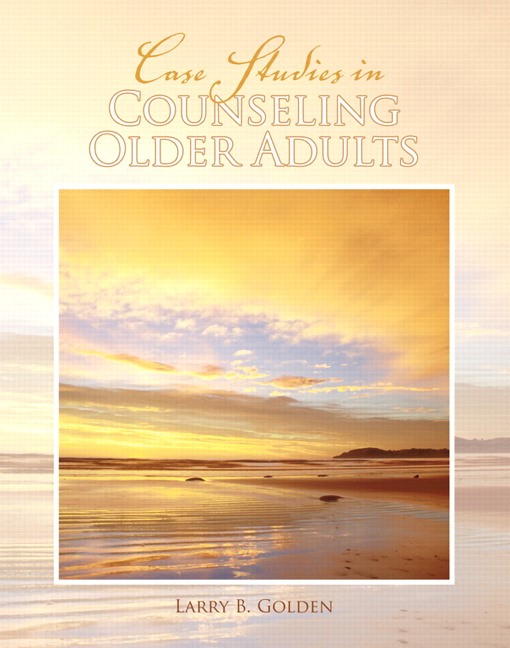
Larry Golden, Ph.D.,is associate professor in the Department of Counseling at the University of Texas at San Antonio. He was in private practice as a psychologist for 25 years and recently completed a post-doctoral internship in counseling with older adults at Jewish Family and Children’s Service of San Antonio. Among his published books are Psychotherapeutic Techniques in School Psychology (1984), Helping Families Help Children: Family Interventions with School Related Problems (1986), Preventing Adolescent Suicide (1988), Ethical Standards Casebook (4th ed., 1990), Case Studies in Marriage and Family Therapy (2nd ed., 2004), Case Studies in Child Counseling (3rd ed., 2002), Case Studies in School Counseling (2007), and Case Studies in Counseling Older Adults (2009). He is editor of the The Family Journal’s “Family Stories” column and serves on the editorial board of Adultspan Journal

In Case Studies in Counseling Older Adults Larry Golden addresses a growing trend--older adults presenting for counseling--and the techniques that may be used to help treat them. Golden has selected cases studies that highlight many common issues faced by older adults today, such as loss of a spouse, health, financial means, depression, and spirituality. The organization of the cases provides the reader with a sense of the contributors' environment, the clients' contextual issues (i.e family, economics, health), the clients' presenting problems, and the therapeutic strategies implemented. This book is a valuable resource to counselors who are seeking to enhance their expertise with innovative approaches to counseling older adults..
After completing this course you’ll be able to: |
||||
Case Study 1 Like a Stab in the Back |
||||
| 1 | Discuss the main focus of stress with Kay. | |||
| 2 | Describe brief counseling. |
|||
Case Study 2 Cystic Fibrosis, Alcoholism, and Meaning |
||||
| 3 | State the theoretical framework for counseling Jillian. | |||
| 4 | Describe relational-cultural therapy. | |||
Case Study 3 Help! She’s Old and I am Young but She’s 57 and I’m 65 |
||||
| 5 | State the original goal for Mary. | |||
| 6 | State why the counselor was critical of Mary’s dress and subservience to Frank. | |||
Case Study 4 The “Transition” Experience: Group Counseling for Baby Boomers |
||||
| 7 | Discuss age-related statistics of Baby Boomers. | |||
| 8 | State the forbidden word of this group. | |||
Case Study 5 The Existential Issues of Freedom and Responsibility: Every Year It Is Getting Harder to Deny Them |
||||
| 9 | State what is meant by: “My initial impression was that the problems were developmental.” | |||
| 10 | Discuss solution-focused therapy when ending the session. | |||
Case Study 6 Sandtray and Artwork: The Woman Who Created Herself |
||||
| 11 | Discuss sandtray play therapy. |
|||
| 12 | Discuss sandtray, sandplay, and sand world. | |||
Case Study 7 Life Losses and Changes from a Transactional Analysis Perspective |
||||
| 13 | Describe the two parts of the Parent ego state. | |||
| Case Study 8 Counseling Flora: Adjusting, Grieving, Dating, and Moving On | ||||
| 14 | Describe the two parts of the Child ego state. |
|||
| 15 | Describe the Child ego, Parent ego, and Adult ego. | |||
Case Study 8 Counseling Flora: Adjusting, Grieving, Dating, and Moving On |
||||
| 16 | State the two approaches Fred used when counseling Flora. | |||
| 17 | Discuss the psychoeducational approach Fred used when counseling Flora in the second round. | |||
Case Study 9 The Second Time Around |
||||
| 18 | Discuss the three goals for Ginny. |
|||
| 19 | State Ginny’s greatest fear through all the counseling sessions. | |||
Case Study 10 Existential Crisis and the Loss of a Spouse |
||||
| 20 | Describe the experiential approach used for Carl. | |||
| 21 | List situations which lead to depression in the older adult. | |||
Case Study 11 An Absence of Light: The Case of Marie |
||||
| 22 | List the three main issues identified by the counselor that affected Marie. | |||
| 23 | List fears people harbor about getting “old.” | |||
Case Study 12 Living with Dying: Alcohol is Not the Answer |
||||
| 24 | Describe the feelings Lloyd’s generation had regarding counseling. |
|||
| 25 | State the reason Hunter did not believe AA meetings would benefit Lloyd. | |||
Case Study 13 I Don’t Know if This Therapy is Helping Me |
||||
| 26 | Compare goals and subgoals for Dora. | |||
| 27 | List the two things the therapist would have done differently in hindsight. |
|||
Case Study 14 Catherine’s Story: Challenges of Aging in a Rural Community |
||||
| 28 | List the four homework assignments for Catherine in Session 1. | |||
| 29 | State the preference the counselor had for sessions with Catherine and Joseph. |
|||
Case Study 15 Mama Del: A Case Study of Counseling in Post-Katrina New Orleans |
||||
| 30 | State the main cause of Mama Del’s psychic pain. | |||
Case Study 16 Dad Just Fell Again: Out of AA and into Grief |
||||
| 31 | Describe the narrative reconstruction orientation used to help Peter. |
|||
| 32 | List the three indicators of grief reconciliation for Peter. |
|||
Case Study 17 “Tired of Living” or “All Packed and Ready to Go”? |
||||
| 33 | Define gerotranscendence. |
|||
| 34 | State why Penny was included in Session 2. | |||
Case Study 18 The Music of Memory |
||||
| 35 | List Brenda’s cognitive distortions. |
|||
| 36 | Describe music therapy. |
|||
© 2007 Homestead Schools, Inc. - Webmaster: Vibhu Bansal